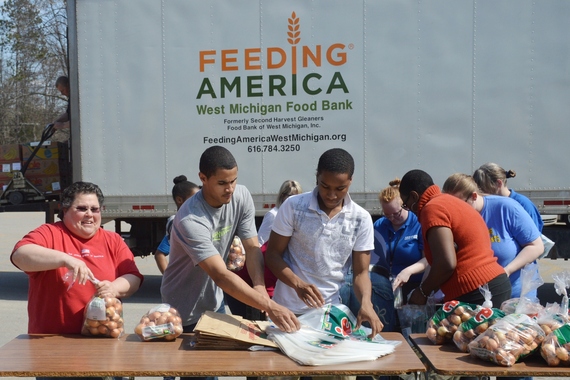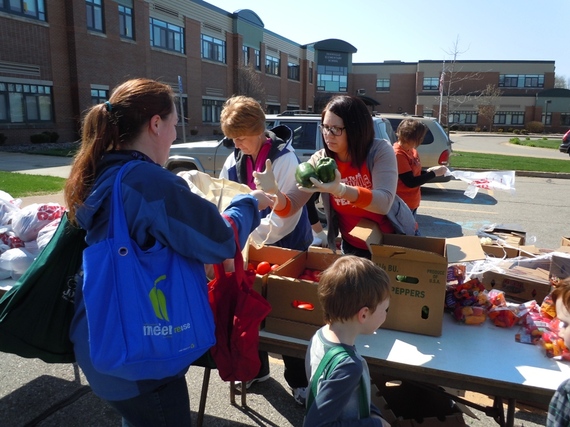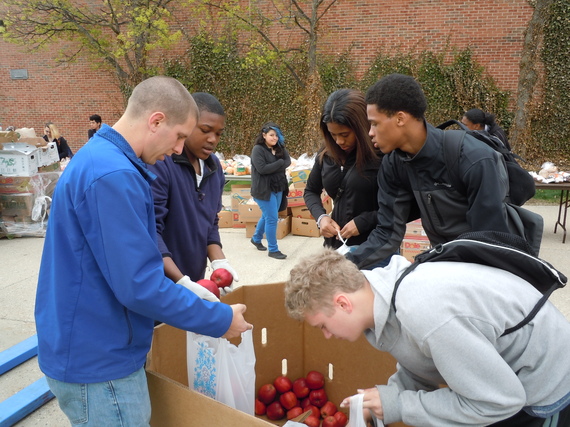West Michigan has long been the poster child for economic resilience in an otherwise troubled state. But its reputation for wealth masks a darker reality: 1 in 5 kids in the region is at risk of hunger.
According to Feeding America's newly released Map the Meal Gap report, the percentage of food-insecure children in West Michigan and the Upper Peninsula increased from 20.2 percent in 2012 to 20.4 percent in 2013, meaning that nearly 114,000 kids who should be concentrating on homework are instead worrying about where their next meal will come from.
Startling as they are, the new numbers haven't caught Feeding America West Michigan Food Bank off guard. For over two years, our Food Bank has been working on an initiative to reach food-insecure kids and their families in our highest-need communities.
In April 2013, we began delivering fresh fruits, vegetables, dairy products and baked goods to local schools. Thanks to a grant from the Michigan Health Endowment Fund and administered by the Food Bank Council of Michigan, the School Mobile Food Pantry program has grown to include 15 campuses with five more expected to join by the end of the school year. Last year alone, the program provided 478,000 pounds of food to families completely free of charge.
Brand-new to the program this spring is Baldwin Community Schools in Lake County, home to the highest child food insecurity rate in all of Michigan. Superintendent Stiles Simmons says the need for food is obvious: more than 90 percent of his students qualify for free and reduced-price meals, while close to 50 percent are in poverty.
"Some of our students don't eat over the weekend. Their moms are working maybe two jobs, and what's in the cabinet is what they get," Simmons said.
"Knowing that our students are going to have nutritious food provided for them at home, not just at school, is comforting."
Fennville Elementary School in Allegan County has been hosting Feeding America West Michigan's Mobile Pantries since the fall of 2013. Principal Albert Lombard recalls how parents reacted initially.
"They had a lot of questions. Some people were even a little hesitant at first, like, what's the catch here?" he said.
But once parents understood that there wasn't a catch, that the school simply wanted to make sure their kids had enough to eat at home so they could concentrate in class, the program took off. Today an average of 80 households attend the distribution each month.
Marilyn, a mother of three young kids, filled four reusable grocery bags with potatoes, cauliflower, carrots, tomatoes, PopTarts and green bell peppers at Fennville's April distribution. She and her husband lost their home to foreclosure shortly before moving to town last year. No longer living near her mother, who used to babysit for the family during the day, Marilyn had to put her 3-year-old into daycare.
"The added expense -- that was our food money, basically," Marilyn said.
But things are looking up. Her husband recently got a promotion, and she's started working at a humane society in the county. "I'm hoping we won't need to come here as much, but it's definitely nice to have the option when I need to," she said.
Martell Flowers has two boys at Union High School in Grand Rapids, another Mobile Pantry site. Last year, Flowers injured her hand while working as a dietary aid in a local retirement home; she's currently on short-term disability as she awaits her second surgery.
Flowers loves the variety of produce on offer at Union's Mobile Food Pantry, especially because fresh fruits and vegetables tend to be expensive at the grocery store.
"You think about cabbage. It's two bucks a head, and here they give you four," Flowers said, pointing out the broccoli, carrots, potatoes and prepared salads on offer. "That's a big variety, and I think it's awesome."
While far too many children are at risk of hunger in our state and across the country, we believe our community has the determination to address the problem. By working together, food banks, schools and public and private funders can solve the problem of child hunger in Michigan and across the country.


